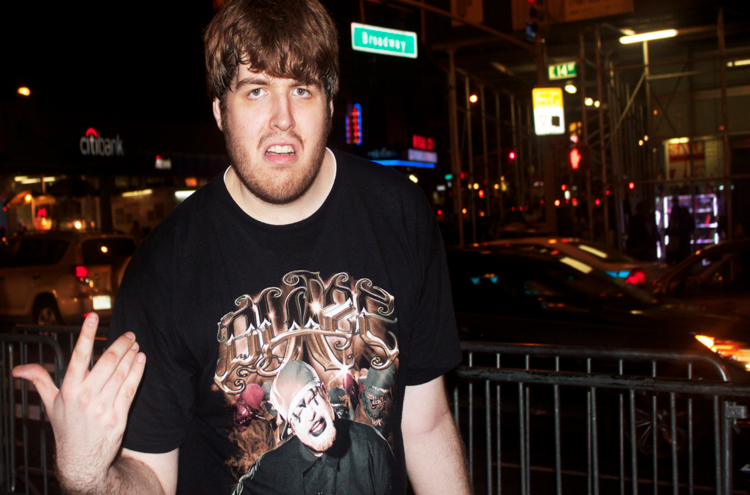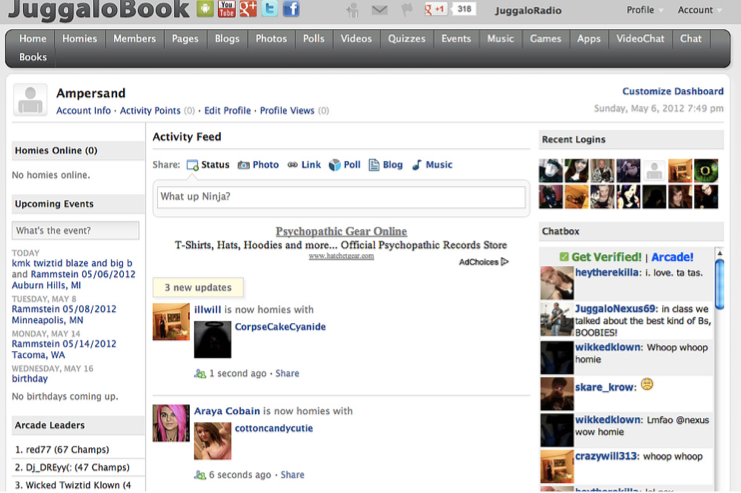How hip-hop horrorcore fans landed on the FBI’s watch list
In the 2011 National Gang Threat Assessment, released in October 2011, the FBI listed a group under the section “Non-Traditional Gangs” that caught the attention of both the media and music fans alike: juggalos.
Juggalos are members of a subculture that grew from an early 1990s devotion of the horrorcore hip-hop group Insane Clown Posse and their Psychopathic Records label mates, who are all known for wearing face paint to resemble sinister clowns, dousing audiences with the cheap Midwestern soda Faygo, and rapping about both the miracle of magnets and physically harming people who wronged them. For their devoted fans, it is more of a lifestyle than a musical predilection.
The FBI, however, sees that lifestyle turning fans down the wrong path. “Yes, the FBI considers fans of the rap group Insane Clown Posse to represent a threat similar to the Aryan Brotherhood and Latin Kings,” wrote Time magazine’s “News Feed” on October 31, highlighting the surprise in their inclusion in the assessment. In the report, the FBI listed juggalos as a “loosely-organized hybrid gang”, claiming they are “rapidly expanding into many U.S. communities.” Officials say juggalos are responsible for several murders in at least 21 states, including Washington, Utah and California.
The report did note that the gang isn’t unified across the nation. “Most crimes committed by Juggalos are sporadic, disorganized, individualistic,” the FBI report claimed, “and often involve simple assault, personal drug use and possession, petty theft, and vandalism… A small number of Juggalos are forming more organized subsets and engaging in more gang-like criminal activity.”
There have been some themes in juggalo-related crimes in recent years. In 2009, Shawn “Skippy Citter” Freemere and Ian “ThrOwT Stabba” Seagraves were convicted of murdering 21-year-old Army vet Michael Goucher, who was openly gay, by mimicking lyrics by Insane Clown Posse, according to the Pocono Record. Similarly, Jacob Robia, allegedly injured three patrons at a gay bar and shot a police officer and a companion, before ultimately committing suicide.
Not all juggalos identify themselves with the gang members noted in the FBI report, however. Both Allie Jeremia (last name has been changed at her request), a Parsons grad student studying the history of decorative arts and design, and Nicholas Gilson, a communications student at Fordham, say not all juggalos identify with the stereotype listed in the assessment.
“Juggalos get a lot of bad heat,” Gilson said, “like we’re a bunch of dumb folks who just like beating up other people and doing crimes and shit, but we’re really not a violent bunch.”

In 115 degree heat in August 2007, Jeremia drove to The Gathering of the Juggalos in southern Illinois, with her friends Brandy, Mike, and Chris. The drive from Bristol, Rhode Island to Cave-in-Rock, the small village where juggalos have convened for the past 12 years, took two days and nearly 50 pages of MapQuest directions. The trip went fine until they approached the campgrounds. They were refused service at gas stations and even food at Pizza Hut.
“The town was protesting The Gathering,” Jeremia recalled, “calling it the devil’s music and the devil’s crowd.”
Insane Clown Posse began as a gang with the same initials, named Inner City Posse. This ICP was founded in 1988 in Detroit, Michigan by Joseph Bruce. After a 90-day stint in jail for death threats and robbery, Bruce, along with Joseph and John Utsler, turned Inner City Posse into a hip-hop group. It was during this time that Bruce and Joseph Utsler adopted the stage names Violent J and Shaggy 2 Dope, respectively.
The group realized their gangster rap style was hurting them, with too many similar acts in the area. In 1991, ICP fell apart. Bruce and Joseph Utsler continued making music, and adapted a horrorcore style of rap inspired by traveling carnivals. Insane Clown Posse was born.
Since 2000, Psychopathic Records hold The Gathering of the Juggalos, a four-day festival in Illinois. Various artists — including ICP — and comedians perform.
When Jeremia and her friends got closer to the campgrounds, the protest gained force. “When we turned onto the road with the campground, preachers were lining the street,” Jeremia said. “One of them threw a Bible at my car.”
What surprised Jeremia was the juggalos’ reaction to the protesters. “The guy in front of us asked a preacher to stop throwing bibles at his car, but that was about it,” she said. “No one got in their face, no one said anything.”
Unlike the gang members listed in the report, Jeremia and Gilson’s experience with juggalos has been positive. “Really we’re just about having fun,” said Gilson. “And we’re really inclusive, too – if we see someone wearing ICP gear out in the street, you can sure bet we’ll stop and say hey.” Gilson recalls a time when he met a man named Steve on the street, who offered to drive Gilson to Baltimore to see Psychopathic Records artist Blaze Ya Dead Homie.
In 2011, director Sean Dunne painted a humanizing portrait of The Gathering of the Juggalos in his documentary, “American Juggalo.” Filmed at the 2011 Gathering, the 23-minute documentary features various attendees from different backgrounds describing their concept of juggalo values.
Jeremia, who calls herself a “juggalette,” cited that caring for your juggalo family is an important aspect of the lifestyle. “It’s not as much about the music as it is about being good to the people around you,” said Jeremia.
“No real juggalo that I know would ever try to tell someone what their beliefs should be,” Jeremia said, “or try to punish anyone at all for not sharing their beliefs. Juggalos come from all walks of life. Some are Christian, atheist, Jewish, some are pro-life, pro-choice, Democrat or Republican — but they all want a ‘family’ based on acceptance, understanding and morality.”

In December 2011, two months after the FBI assessment was released, Ranker published a list of the “10 Most Violent Juggalo Attacks Ever,” noting an incident at the 2010 Gathering. Juggalos threw various objects at Tila Tequila while she attempted to perform onstage, from empty bottles of Faygo and rocks, to a bag of chicken and a firecracker that exploded, burning some of her hair. Some juggalos followed her to her trailer, broke the windows, and tried to attack her.
The most recent victim of a possible juggalo crime, Jessica Funk-Haslam, 13, was found murdered inside a baseball dugout at Rosemont Community Park in Sacramento, California, on March 6, according to CBS San Francisco. The Sacramento County sheriff’s department conducted DNA testing on a group of juggalos at Rosemont High School, according to Fox 40, in an attempt to find the killer. There are currently no suspects.
Many juggalo-related crimes are committed with hatchets, axes or meat cleavers — likely inspired by both Psychopathic Records’s logo and juggalo artists’ violent lyrics. In the ICP song “The Strangeness,” off the 2002 album “The Wraith: Shangri-La,” ICP raps, “I wanna stab, stab, stab/It’s like, murder be giving me a call/I need to/Yeah, yeah, yeah/Let me make your pain be gone.”
Jeremia, who doesn’t associate herself with the FBI’s portrayal of juggalos, doesn’t see the lyrics as condoning violence. “The music about murder is really more of an extreme example of what happens to people who don’t do good in their world and their communities,” she said. “The people that get killed throughout their songs have done serious wrong throughout their lives — they’re like sex offenders (among other things) that cause them to get killed or punished for it.”
*****
The juggalo community — members often call it “the underground family” — is a close-knit group locally, nationally, and worldwide.
Although neither Jeremia nor Gilson have seen a prominent juggalo community in NYC, area juggalos can still connect online. In March, ICP created JuggaloBook, a social networking website similar to Facebook. Juggalos and juggalettes can add “homies” rather than friends, and “Whoop Whoop!” a post rather than “like” it.
Jeremia and Gilson, however, are frustrated with teasing from outsiders. “I still get made fun of every time people find out I’m a juggalo,” Jeremia said. “Every single time. Especially as a graduate student, people think I should ‘grow out of it.’ Well, I can’t help what I like and [I] don’t try to change their beliefs.”
Gilson wishes the public would take a note from juggalo values and be more accepting of the community. “I’ve personally been called white trash, wigger, and a whole bunch of other names just for wearing a Blaze Ya Dead Homie shirt,” Gilson said. “[My parents] have this idea, and I know that a lot of others feel this way too, that the music you listen to reflects who you are, and so they think that listening to ICP makes me some kind of stupid moron. Fuck that. We try to be inclusive of everybody, yet everybody goes out of their way to avoid including us. There’s something seriously wrong with that.
Reporting by Kareem Samuels







Heya i am for the first time here. I found this board and I find It truly useful & it helped me out a lot.
I hope to give something back and aid others like you helped me.
This post will help the internet users for building up new
blog or even a weblog from start to end.
Heya are using WordPress for your site platform? I’m new to the blog
world but I’m trying to get started and set up my own. Do you need any coding knowledge to make your own blog?
Any help would be really appreciated!
Hi, I do believe this is a great web site.
I stumbledupon it 😉 I’m going to revisit yet again since I bookmarked it.
Money and freedom is the greatest way to change, may you be rich and continue to help
other people.
Every weekend i used to visit this website, for the reason that i
wish for enjoyment, for the reason that this this web page conations genuinely pleasant funny material too.
we are seen as bad people mainly cus they doent understand who we are or why we are how we are. but at least we stand together. got each others backs and got much love for each other. yes some of us do fall into the cracks and become a criminal but most of us just want to have someone to be connected with and feel at home around. WHOOP WHOOP from floida